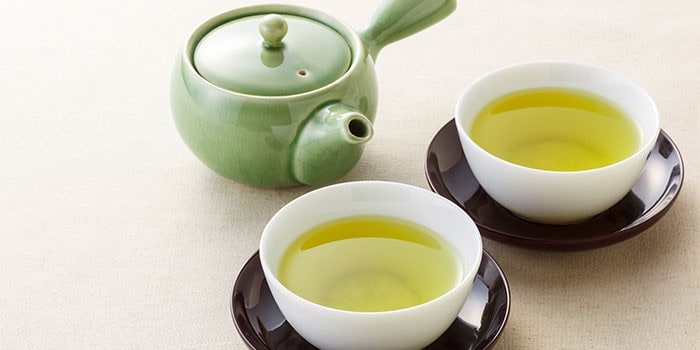Interested in trying our FREE 7-day healthy diet plan? Click here and choose between our meat eaters, vegetarian or vegan meal plans.
What is green tea?
All types of tea, even your regular cup of builder’s, are made from the camellia sinensis plant. Green tea gets its name from the emerald green colour created when brewing these unprocessed, unfermented leaves.
With origins dating as far back as 5,000 years, green tea is commonly drunk and grown in East Asia where the health properties are highly valued.
Green tea benefits may include:
- High in polyphenols which protect the body against disease
- Natural stimulants, including caffeine, may enhance brain function
- Boosted metabolism
- Beneficial effect on blood sugar control
- Reduced risk of heart disease
Discover our full range of health benefit guides and read more about the profile of other teas in our series: including ginger tea, peppermint tea, chamomile tea and rooibos tea.
Nutritional benefits of green tea
There is no nutritional value in terms of macronutrients in green tea, but the drink’s primary benefits lie in the bioactive compounds it contains.
The tea you use, the temperature and the steeping time all have a significant effect on the levels of these compounds. Warm and ambient temperatures are best to retain antioxidant compounds, so allow the boiled water to cool slightly before pouring over the tea leaves, and steep for between 2-3 minutes.

Top 5 health benefits of green tea
1. High in protective polyphenols
Compounds called polyphenols are known to protect the body against disease and make an important contribution towards a healthy, balanced diet. These antioxidant compounds are found in a wide range of fruit, vegetables and other unprocessed foods. Green tea has numerous health benefits many of which are attributed to the fact that it is largely unprocessed and rich in these plant compounds. The main bioactive compounds in green tea are flavonoids, with the most potent being catechins and epigallocatechin gallate (EGCG).
2. May boost brain function
Green tea contains a number of natural stimulants, including caffeine, which although not as high as coffee, may still help maintain alertness and focus. In addition to this, green tea is a source of the amino acid L-theanine, which has a relaxing effect; it does this by increasing mood-enhancing brain chemicals including GABA, dopamine and serotonin. The beneficial polyphenols of green tea may also help slow the effects of aging on the brain.
3. May boost fat burning
Some research suggests that green tea may boost metabolic rate and increase fat burning. This is thought to be thanks to the natural thermogenic properties provided by caffeine, and by the plant compounds such as catechins.
4. May support blood sugar control
Studies suggest green tea may improve insulin sensitivity and as a result have a beneficial effect on blood sugar control.
5. May reduce the risk of heart disease
Research suggests green tea is a useful beverage for helping to reduce the risk of heart disease and associated conditions, such as stroke. One way it may help is in its beneficial effects on cholesterol management.
Is green tea safe for everyone?
If you’ve been diagnosed with iron-deficiency anaemia you should be aware that, like other teas, green tea contains natural compounds called tannins. These compounds interfere with the absorption of iron – for this reason it’s useful to avoid drinking tea with an iron-rich meal and leave at least one hour before having a brew.
Because of green tea’s beneficial effects, a number of ‘health’ products include traces of green tea. However, there is limited evidence to suggest these products are effective. If you are hoping to use green tea for medicinal purposes, refer to your GP to ensure you may do so without risk to your health.
If you are sensitive to caffeine, it is advisable to limit the total number of caffeinated drinks you drink in a day. Too much caffeine may disrupt sleep and, in some people, increases anxiety; if this is relevant to you, look to reduce your intake and aim to have your last caffeinated drink at about 12 noon.
Looking for more information on how much caffeine is in tea? Our in-depth guide compares different types of tea and discusses which factors affect the caffeine content.
Enjoyed this? Now try…
All our health benefits guides
What are anthocyanins and why are purple foods so healthy?
More health and nutrition tips
Jo Lewin is a registered nutritionist (RNutr) with the Association for Nutrition with a specialism in public health. Follow her on Twitter @nutri_jo.
All health content on bbcgoodfood.com is provided for general information only, and should not be treated as a substitute for the medical advice of your own doctor or any other health care professional. If you have any concerns about your general health, you should contact your local health care provider. See our website terms and conditions for more information.




